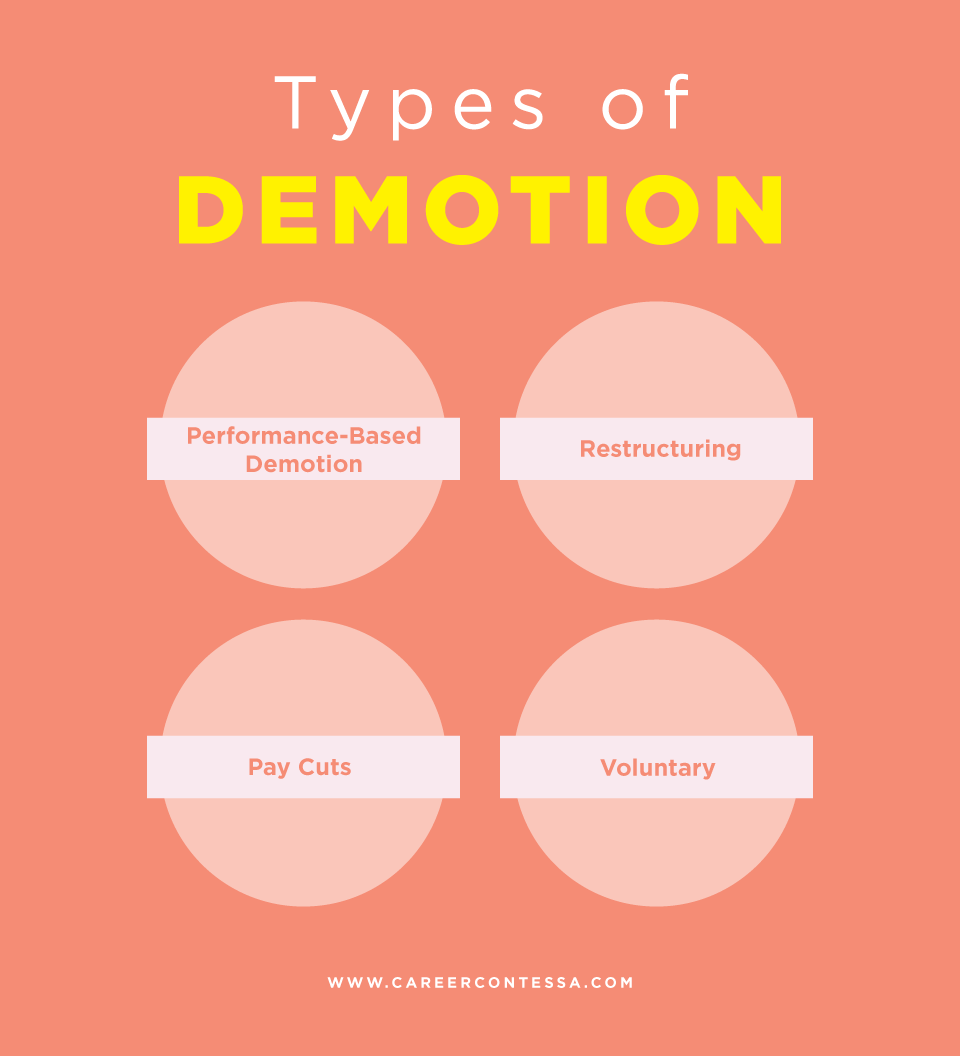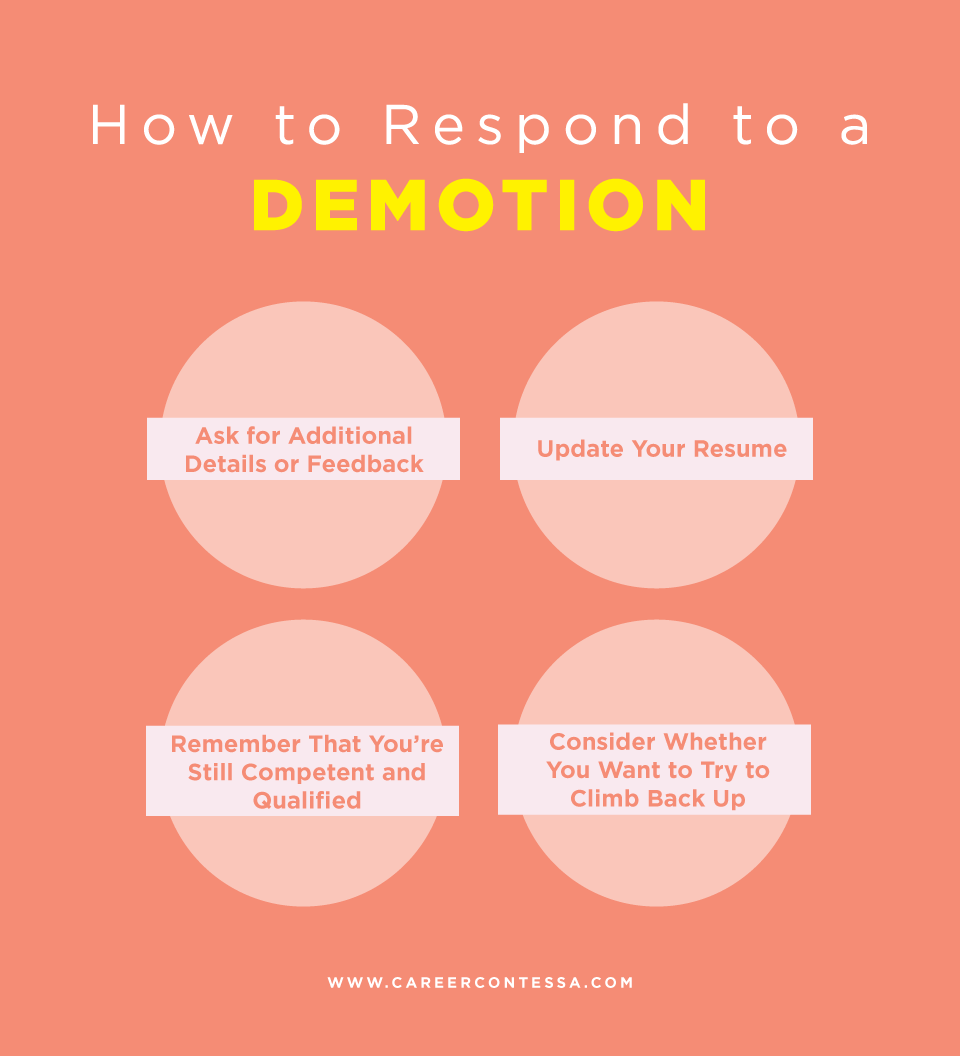The internet is full of articles about how to land a
promotion at work or find a
new job, but what about when you're stuck in limbo—specifically, in the throes of a demotion at your current company? And what does getting demoted even mean exactly?
Today we’re breaking down all the not-so-fun facts about getting a demotion at work, plus a few tips for rebounding if it’s happened to you.
Because the best way to come back from a demotion is to know exactly what you’re up against—and how you can start moving forward again. So without further ado, first up:
What Is a Demotion?
A demotion in the simplest sense is when a company (or sometimes an employee, which we’ll discuss in a moment) decides to lower an employee's status, title, and (usually) pay.
The tricky part about demotions, though, is that it’s rare for someone to say, “We’re demoting you.” There are all sorts of words that people use to offset the sting.
Restructuring or organizational restructuring. “The company is going through a reorg.” Reassignment. In most cases, the demotion is compulsory—meaning the employee doesn’t get a say in the situation. Still, occasionally there are reasons why an employee might request a voluntary demotion.
The Reasons For a Demotion at Work
A recent
OfficeTeam survey showed that 46% of companies have demoted employees according to HR managers. That's almost half of the companies surveyed, which tells you a demotion is not
that uncommon. However, the reasons for getting demoted really vary. The survey cited the following as the most common reasons:
- Poor performance
- Backtracking—a recent promotion that wasn't going according to plan
- Organizational restructuring including the elimination of a position
- An employee's request to have a lesser role or less responsibility
We can explore these reasons a bit more with the common "types" of demotions.
Types of Demotion
Performance-Based Demotion
This is maybe the most awkward form of demotion, usually due to a current employer being unhappy with your poor
performance and wanting to give you a lower level of responsibility. One use case: It’s fairly common for a person who does great work to get promoted into a
management role only to prove that they’re not management position material. The company might plan a demotion accordingly.
Restructuring
Most often this happens at larger companies where there’s a very specific (and complex) hierarchy of positions within departments. Another pattern: it often takes place during the merger of two companies or under new ownership or leadership.
Certain levels get removed, “flattening” the hierarchy. That might mean that suddenly the Associate Creative Directors and Senior Creative Directors find themselves at the same level. When this happens, you typically see a high turnover rate, especially among senior employees who suddenly find themselves with no potential for growth or upward trajectory within the company.
Mergers can even lead to
layoffs for some colleagues and if that happens, don't forget about
severance.
Pay Cuts
Sometimes a company runs into serious financial problems and suddenly makes a very difficult decision: to
cut pay across the company because they simply can’t afford to make payroll. Again, a pay cut generally leads to a mass exodus of team members.
Voluntary
It's completely possible that an employee demotes themselves. This could be for a variety of reasons such as job responsibilities,
fatigue from the corporate ladder, or a new work-life stage. They might be ready to create a transition plan with the company but reach an agreement to stay on in a reduced capacity, or perhaps a new child at home means that a
flex schedule is the best move for now. In any case, it’s discussed more rarely than compulsory demotions.
On the most basic level, a demotion means losing a position of leadership or responsibilities—which is usually a sign that it might be time to
look for work at a new company.
How to Respond to a Demotion
It’s very difficult, especially when you’re not expecting it, to respond to a sudden reduction in responsibility and/or pay. Still, now’s the time to make some decisions.
1. Ask for Additional Details or Feedback
Employers get uncomfortable talking about demotions because, obviously, no one’s happy when they receive one. You may not have it in you to discuss the situation on the day that you’re demoted, but you should ask for a meeting no more than a few days after that either with HR or your boss.
Ask them to explain to you why the decision was made and what metrics were used to determine whether you should be demoted. The more knowledge you have, the better.
2. Update Your Resume
3. Remember That You’re Still Competent and Qualified
4. Consider Whether You Want to Try to Climb Back Up
If you’re facing a performance-based demotion, chances are you’ll probably want to start fresh at a
new company. But what if the feedback you receive makes you realize that you do have room to improve?
If that’s the case, you might want to start documenting your progress in a
work journal and request that you and your boss revisit the situation in a set period of time.
How To Handle A Demotion
1. Get Support
Getting a demotion can hurt your
confidence and make you feel unappreciated and undervalued. It can make you question the quality of your work, your office relationships, and the future you want for your career. It's a whole mix of emotions, and our first piece of advice is to lean in to all that pain.
Yes, lean into the hard emotions so you can acknowledge them and start to work through them. That might include close friends and family, therapy, or even working with a
career coach.
2. Reflect on What Happened
You asked for some feedback on what led to this decision and collected any additional information your employer could share. Now we want to assess what happened and any role you played in the decision. If you were demoted because of poor performance, you'll want to ask more detailed questions about what improvement they would like to see and by when. You might want to ask your peers for feedback on your work. Learning how to
give and receive effective feedback will help you edit your behavior, work, and communication moving forward.
3. Create a Plan
The next thing you'll want to do is create a plan with your manager on what happens next. How does management plan on communicating or sharing your demotion news with others? What's your new job title and what are your responsibilities? Can you get a new or updated job description? Does your manager already have a transition plan in place or is that something you two will create together?
You might also use this time to ask your boss for a regular 1:1 meeting so as you progress in your new role, you're getting regular feedback. You'll also have regular check-ins to make sure you're doing work that is aligned with your manager's goals and
KPIs.
4. Strategize for Your Future
Instead of viewing your demotion as the end of your career, look at it as an opportunity to strengthen your skills or fill a skills gap.
Create some goals to help you improve your performance and edit the way you've worked in the past for the better. And most of all, use this as an opportunity to think about your future and where you want to take your career.
After a Demotion: Should You Stay or Move On?
While you're thinking about your future and what you want to do with your career, a natural question will be, "Do I stay in my current role or start looking for something new?" We recommend taking your time to consider this carefully—remember the grass is not greener, it's just different grass when it comes to a new job.
That means it might be worth it to give your new (demoted) role a real shot at success before you throw in the towel. The upside of this is that if you ultimately do decide to leave your current role, it works in your interest to
quit with a great reference in hand. Let's review the pros and cons of each option.
How to Rebound from a Demotion and Stay at Your Company
So how exactly can you bounce back after you've been "benched" at work? Start with being humble. See this as a wake-up call to remind you of what you have in your current role and how you can get back to a place of engagement, being productive, and making sure you're creating work that matters.
Next, focus on getting back to your flow at work. Sure your emotions feel big right now—anger, resentment, humiliation, and more—but you've come up with an action plan for moving forward, and now you need to stick with it and hang in the "pocket" of discomfort for a bit.
Lastly, be patient. Remember that you're moving into a new role and that might come with a learning curve. Maybe you used to be leading a team and now you need to learn to be a player on the team. Rebounding from a demotion takes time, so give yourself some grace as you slowly rebuild a great reputation, skills, and accomplishments. And remain optimistic—just because your role has changed doesn't mean great opportunities are closed off to you forever.
How to Move on from Your Company After a Demotion
If you've decided that no matter what, it's time to move on from your company and role, then it's time to launch a job search. One of the upsides of looking while you're still employed—even if it's a demotion—is that it's always easier to
job search when you're still employed.Also, if you
quit without another job lined up, you are not eligible for
unemployment. Depending on how long your job search takes, you might have to use lots of your
emergency funds to keep you afloat. If you can skip that stress, job searching while you still have a paycheck is best. Just make sure to keep in on the down-low from your current boss!
How to Explain a Demotion in a Job Interview
We know you're probably nervous about talking about this with a future employer, but a demotion doesn't have to be an immediate deal-breaker. Your goal is to reframe the demotion as a positive. Instead of dwelling on your demotion, highlight your strengths, past learnings, and how you've gained clarity on what you want to do next and why.
Perhaps your demotion taught you about a communication gap you had but you've taken online courses to help you learn better communication skills. Or maybe your demotion identified a weakness you had with a specific skill, but you've taken specific steps since then to strengthen it.
If your demotion was because of something outside of your control like restructuring, be honest about that, but don't use this as a time to blame the company or complain.
You can position yourself as the ideal candidate by tailoring your answers to what matters most to the company and the role. This means doing thorough
research on the company and
getting clues from the job description. When you know what the company is looking for, what they value in their culture, etc., you can make sure to answer their questions by highlighting how you fit and the experience you can bring.
How to Answer Interview Questions About a Demotion
1. Don't Blame Other People or the Company
As we mentioned before, don't use your interview time to criticize or blame your last company. Perhaps the demotion was due to their poor management skills, but you don't need to share that with a future employer. Your goal is to address the demotion quickly and move on to more important parts of the interview.
2. Spin Your Demotion as a Positive
If the interviewer asks more questions about your demotion, find ways to spin it as a positive. Perhaps you were demoted off a client's account but that led you to take online courses on project management and work with a career coach. Now you're much more confident in your skills to manage lots of projects at once.
3. Focus on Why This New Company + Role Are a Fit
Focus less on why you're leaving your past job and more on why you're interested in this new job. Do you admire their leadership? Maybe you're a longtime user of their product? Perhaps the role uses your strengths and is looking for a person with your exact experience. By researching the role and the company ahead of your interview, you can point to experiences they will find impressive.












